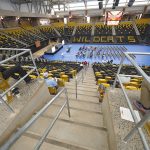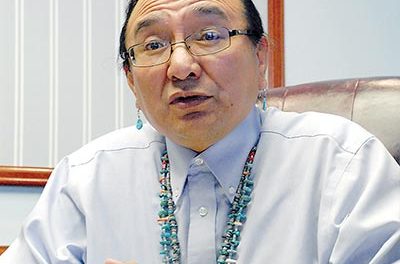
50 Years Ago: Vietnam weighs heavily on Diné
The Vietnam War is weighing heavily on the Navajo people and on the staffers who put out the Navajo Times each week.
For the past six months, the tribal newspaper has had at least one story per month on a tribal member who has died in the war or who was being honored for bravery. This week 50 years ago, the story was about a Navajo soldier who did both.
In May 1968, Specialist E4 Bennie R. Dale died a hero’s death fighting for his country and this week he was honored by the military for his bravery.
His wife, Marilyn Dale, from Shiprock, was on hand during the ceremony at the Fort Wingate Army Depot where she accepted a silver medal given to him on behalf of a grateful nation.
Spec. Dale was a machine gunner with the Second Battalion, 5th Cavalry. On May 12 his unit was conducting a search and destroy mission near Ky Lam.
“When his unit was became engaged by a large hostile force, Spec. Dale exposed himself to the intense hostile fire as he placed effective suppressive fire on the insurgents’ position,” said the citation.
“Disregarding his own safety, Dale moved to a forward fighting position in order to suppress an enemy mortar assault that had already resulted in several casualties,” it added.
As a result of his actions, he was mortally wounded.
“His gallant actions were in keeping with the highest traditions of the military service and reflects great credit on himself, his unit and the U.S. Army,” the citation stated.
He was also awarded, posthumously, with the Air Medal and the Purple Heart, the Times reported. Before his death, he had also been awarded several other medals for his participation in the war.
Besides his wife, he was survived by a daughter, Melissa Rose, who was six months old.
By now, according to figures released by the tribe on Navajos fighting in the war with more volunteering each month, Navajo Tribal Chairman Raymond Nakai had said numerous times that he was proud that the military’s recruitment drive had surpassed its goal each time because of the patriotism of Navajo youth.
In other news, Dick Hardwick, the general manager of the Navajo Times, this week took Ted Mitchell to task in one of the strongest editorials he has written so far.
Mitchell, as you may recall, was the director of DNA who was booted off the reservation after he laughed during an Advisory Committee meeting while Annie Wauneka was speaking and, believing he was laughing at her, she slapped him several times.
By now Mitchell had filed a lawsuit in federal court asking to be allowed back on the reservation and claiming that his rights under the recently passed Indian Civil Rights Act had been violated.
That’s right, said Hardwick, the first person to file suit under that act was not an Indian but a white man.
Hardwick pointed out that if the federal courts carried out its usual policy of not interfering in tribal matters, Mitchell didn’t stand a chance of winning his case.
And while members of the Navajo Tribal Council has made it plain they didn’t want him back on the reservation, there were others who felt the same way, said Hardwick. And at the top of that list were traders on the reservation.
Under Mitchell, more than a dozen traders had been sued for unfair practices and accused of taking advantage of Navajo customers. These cases were going through the tribal and federal courts and traders said that if DNA was successful, it may be the end of the trading posts on the reservation.
The traders were arguing that the relationship between Navajo customers and themselves was based on a sacred trust that had been around for years. The Navajos needed the traders and the traders needed the Navajos to survive and the threat of lawsuits was greatly upsetting this balance.
In hindsight, however, Hardwick and the traders were wrong when a few years later the Federal Trade Commission held hearings on trader abuse and business on the reservation and forced the traders to change the way they treated their customers.
Five years later, there were only a handful of traders left and the Navajo people continued to thrive.
For Hardwick, however, he took up the cause to keep Mitchell off the reservation, saying his presence was causing too many controversies and the Navajo people would be better off if he just left and turned the job over to someone else, preferably a Navajo.
And finally, the Navajo Times reported that Ned Hatathli, who was spending most of his time in 1968 getting Navajo Community College up and running, was a big supporter of the moon project.
Since the white man seems so interested in going to the moon, he said, maybe one day they will get their wish and leave the Indians alone so we can run our own affairs.
To read the full article, pick up your copy of the Navajo Times at your nearest newsstand Thursday mornings!
Are you a digital subscriber? Read the most recent three weeks of stories by logging in to your online account.







 Highway 264,
Highway 264, I-40, WB @ Winslow
I-40, WB @ Winslow